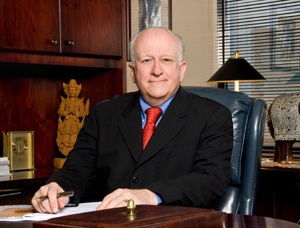Ed Fuller Marriott

Based at the company’s headquarters in Washington, DC, he has overall operating responsibility for managed and franchised hotels spanning seven lodging brands and brand extensions outside the continental United States and Canada. This region includes Hawaii and 67 countries in Asia, the Caribbean, Latin America, Europe and the Middle East. Under his leadership, Marriott brands have grown to be the second largest in the Asia-Pacific region, second largest in South America and first in Europe and Africa. He had helped to build Marriott’s portfolio outside the US from 16 properties to about 350 today and on its way to reaching 500 hotels outside of North America by 2012.
BTN: Which territories/countries are you focusing your efforts on most and why?
EF: Marriott International continues to expand its brands portfolio in all markets. We are now represented in 67 countries around the world and this year alone we expect to open 25,000-30,000 rooms globally. Our strategy has always been to be represented in the world’s gateway and major cities and established resort destinations with our full-service brands; then to expand our portfolio into secondary and tertiary markets with our limited service brands. Outside the United States, China, India, Thailand, the Middle East and North Africa are especially robust at this time.
BTN: What were your key highlights at this year’s WTTC Summit in Florianopolis?
EF: Each WTTC Summit has its own enthusiasm and energy. This year, especially gratifying was the delegates’ interest in addressing sustainability in every facet of travel. Other areas of special focus were strategies on how emerging countries can cooperate with each other to their mutual benefit and the group’s focus on growth even in this tough business climate.
BTN: What is the trick to thriving, and not merely surviving, in a downturn?
EF: There is no trick. To thrive in a downturn, concentrate on creative marketing and sales opportunities, maintain close relationships with your customers, identify ways to reduce back of house costs through technology and shared services, enhance customer-facing initiatives and look to the future. All these combine to help keep your focus on being prepared to capitalize when the good times return.
BTN: The slowdown is hitting Dubai particularly hard. Do you see it as a risky time to be opening a regional office there? And what mistakes has it made to have caused such a slump?
EF: As I indicated earlier, we take the long view and are focused on growth. So for us, now is the right time to establish a regional headquarters in Dubai as we look to expand our portfolio throughout Africa and the Middle East. For its part, Dubai expanded at an exceptionally strong pace during a super-heated global economy. As the global recession took hold, Dubai was especially hard-hit in its real estate sector. However, Dubai has taken steps to mitigate against the downturn – such as the aggressive pricing strategies employed by Emirates Airlines which is helping to ensure that a healthy pace of visitors continue to stream into Dubai – despite the global recession.
ADVERTISEMENT
BTN: What will be the biggest changes within hospitality over the next 10 years?
EF: Several changes are underway right now. For one thing, we’re only beginning to experience the emergence of new source markets for traditional destinations as millions of people venture beyond their national borders for the first time. For another, in the economy segment of our business, you are beginning to see technology replacing humans at various touch points of the travel experience. And finally, the full impact of the internet on our distribution channels is yet to be felt.
BTN: How have the priorities of the industry changed over the last decade? How has this changed your role at Marriott?
EF: The industry has changed a lot over the past 10 years. Sustainability has become a major focus area – reducing energy and resource consumption, preserving our natural and historic attractions and the like so that future generations of travellers continue to have a reason to visit places and experience cultures that are different from their own. Another change has been the proliferation of global branded hotels as travellers venture beyond their national borders and the comfort of staying in properties that are familiar to them. The accelerating demand for service-minded employees is another change. All these changes combine to create an environment in which senior managers must have a broader knowledge of the industry and the world in general beyond simply operating a good, clean, safe hotel.
BTN: Do you see lifestyle hotels as a fad or are they here to stay?
EF: Here to stay.
BTN: Which career achievement are you most proud of?
EF: There are many, but I’m most satisfied by helping to build Marriott’s portfolio outside the US from 16 properties to about 350 today and we’re on our way to reaching 500 hotels outside of North America by 2012. I’m also very proud of all the new jobs and career-building opportunities for more than 75,000 people that have resulted from this expansion – with more opportunities on the way.

